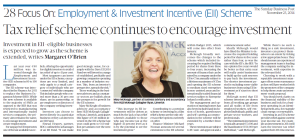Tax relief scheme continues to encourage investment
Investment in EII-eligible businesses is expected to grow as the scheme is extended, writes Margaret O’Brien
Last year over €40 million was invested through the Employment and Investment Incentive (EII) scheme in 80 to 100 companies.
 The EII scheme was introduced in the Finance Act 2011 to replace the Business Expansion Scheme (BES). While the new scheme is available to the majority of SMEs as opposed to the BES that was restricted to manufacturing and internationally traded services companies, the primary aim remains the same, to encourage investment and create employment.
The EII scheme was introduced in the Finance Act 2011 to replace the Business Expansion Scheme (BES). While the new scheme is available to the majority of SMEs as opposed to the BES that was restricted to manufacturing and internationally traded services companies, the primary aim remains the same, to encourage investment and create employment.
For taxpayers EII represents one of the last available tax reliefs, offering the opportunity for eligible investors to avail of tax relief of up to 41 per cent.
Most taxpayers can invest under the EII scheme, exceptions are very limited, and only apply to a small category of individuals who are ‘connected’ with the company. This includes people who control more than a 30 per cent share, are in partnership, or are employees or directors of the company seeking investment.
Investors can choose to invest directly in a particular business or they can invest in an EII Fund.
Sinead Heaney, partner, BDO, outlined the advantages of an EII Fund. “It can make good strategic sense, for example with the Davy EII 2014 Fund we will invest in a range of established, profitable and growing companies operating in a number of industry sectors. This, from an investor’s perspective, spreads the risk.”
Those working in the business advisory and accountancy sectors are bullish about the prospects for growth for the EII scheme. Mary McKeogh of business advisory and accountancy firm HLB McKeogh Gallagher Ryan, Limerick, anticipates this figure of €40 million invested in the EII scheme last year could grow to €60 million per annum over the next few years.
“This increase in EII investments will be driven as much by the lack of tax relief schemes available to those who pay income tax at the higher 41 percent level as it is by the potential to see the investment grow.”
Contributing to a pension scheme or investing in a film relief scheme are the only other tax relief options currently on offer.
Finance Minister Michael Noonan announced several extensions to the EII scheme within Budget 2015, which will come into effect from January.
McKeogh broadly welcomes the changes to the scheme which included increasing the required holding period for shares from three to four years, increasing the amount of finance that can be raised by a company under the EII to €5m annually subject to a lifetime maximum of €15m and opening the EII scheme to medium sized enterprises in non-assisted areas and internationally traded financial services subject to Enterprise
Ireland certification.
The management and operation of nursing homes has also been included and inclusion of hotels, guesthouses and self-catering accommodation
in the scheme will be extended by a further three years.
These extensions are subject to EU state-aid approval and a commencement order. Ideally McKeogh would have liked the Minister to increase the required holding period for shares to five years rather than four, as was the case with the EII’s, the BES. “In my opinion five years would be better as that extra year will really assist businesses to build up the cash reserves to pay back the investment. The shorter investment period
is excluding some viable businesses from using EII investment as it’s just too short for them.”
McKeogh noted that EII scheme investors are drawn from all working age groups and all walks of life from employed workers, self-employed individuals, public and private sector workers, and professionals.
“The minimum investment is typically around €5,000 and the maximum is €150,000 per individual,” said McKeogh.
While there’s no such a thing as a safe investment, investors can protect themselves to an extent by ticking a few appropriate boxes. They should ensure an experienced management team is leading the company seeking the investment, with expertise in the relevant field.
Choosing to work with a reputable investment manager offers some reassurance as they will have worked with the promoters of the company to help them create an investment-ready proposal.
You should seek clarity on the financial stability of the business and look for a business operating in an identified growth area, for example clean energy or renewables.
Investing in an EII scheme provides relief against current year income tax. For example an investment in 2014 will earn the investor tax relief against their 2014 income tax.
This article appeared in the print issue of the Sunday Business Post on 23 November 2014.
